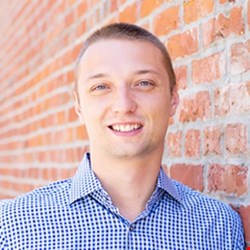
Interviewing the CEO of a major cybersecurity firm as part of our Next Gen section may raise some eyebrows, but Marcin Kleczynski from Malwarebytes has proved how to be successful in developing your own company from an idea in this industry.
Born in Poland in 1989, Kleczynski's first encounter with malware was when downloading a game, and pop-ups began to appear on his screen. “The malware was benign compared to what we see now, but I didn’t know what to do so I Googled it and found a security forum of users helping people like me to get malware off my computer. It was like a public service, and the woman who helped me is now our director of threat research.”
This encounter led Kleczynski to develop the product that would become Malwarebytes, all whilst he was a student at the University of Illinois. Whilst he was studying for a computer science degree, the origins of Malwarebytes were ran out of the dormitory he lived in, when a strange encounter happened.
“In 2009/10, I was in my dorm room dis-assembling a virus to see how it worked and see how we could better detect it. The intrusion systems picked up on this and warned me that I had been isolated and needed to call a number, and a student from helpdesk turned up.
“He said ‘it looks like you’ve been infected’ and he ran Malwarebytes right in front of me! As I sat there laughing it cleaned up the virus and released the computer back onto the network. I was building the next version of the software at the time, and they released it from helpdesk.”
The company continued to grow whilst Kleczynski was a student, beginning as a free product in January 2008, and it is now used by thousands of companies who have the option to scale to a paid model.
In terms of advice on how someone could follow his example to form their own companies, Kleczynski said that there are pros and cons to a free model. “I’m a huge fan of freemium,” he said. “I think that is one way to distribute your software and I think it gets a lot of users in the door but you’ve got to have the right features to monetize from those users.”
He said that to be an entrepreneur in this industry, you have to be prepared to work hard and be prepared to not make money immediately – some people expect to make money in the first 30 days, when it took him five years to make his first dollar!
“Don’t go out starting to fundraise, solve a problem that you’re passionate about to get an idea off the ground. Don’t think of it as something you can make money off of, that’s completely the wrong approach.”
He said that companies that are doing well do not have problems raising money; it is those companies that are not doing well that need to work harder for funding. “If you can show revenue growth and remain somewhat profitable, especially in software, this should not be a problem.”
Another advice point was the branding of the product. He said that in the early days of product development, anti-virus would have a version with a year number – but if you are not making money every year how can you invest in capabilities, how can you staff your company and do R&D? He recommended having the one product and adding new features for a subscription model, rather than being in a position to create a new product year after year.
Finally, as you scale, he recommended surrounding yourself with people who are positive and who can say, should something go wrong, ‘we can work through the night and fix this’, not ‘I’m sorry it’s 6pm and I’ve got to go home.’
Marcin Kleczynski and Malwarebytes is a success story for how to build a brand from an idea, and hopefully one that will inspire others who are wondering how to take an idea to a product.
Malwarebytes founder and CEO Marcin Kleczynski started the company to create the best disinfection and protection solutions to combat the world’s most harmful Internet threats. Marcin was recently named “CEO of the Year” in the Global Excellence awards and has been named to the Forbes 30 Under 30 Rising Stars of Enterprise Technology list and the Silicon Valley Business Journal’s 40 Under 40 award, adding those to an Ernst & Young Entrepreneur of the Year Award.
